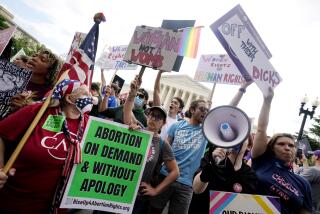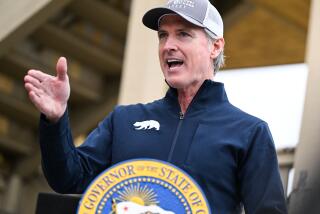Column: David Hogg’s call for a boycott of Laura Ingraham is in the best tradition of democracy
The call by David Hogg, a survivor of the Parkland, Fla., school shooting, for a consumer boycott of Laura Ingraham’s advertisers has turned the spotlight again on the perennial questions about boycotts — Do they work? Are they fair? Are they just?
Numerous pundits have expressed concern about the idea of mustering advertisers and consumers against a public figure just because of her words. On CNN, media critic Brian Stelter said, “I’m personally pretty wary of this. I think it’s dangerous….My view is, let’s not shut down anyone’s right to speak, let’s meet their comments with more speech.”
But Hogg’s critics typically approach him from the right. At Redstate.com, for example, he’s labeled a “bully” for daring to goad Ingraham’s advertisers into dropping her show. And Joe Concha, a media columnist for the Washington publication the Hill, frets that “if a boycott succeeds here, it sets the kind of precedent that will forever change what the First Amendment is supposed to stand for...The effort to silence a voice, to essentially end a career, based on something like this sets not only a dangerous but completely un-American precedent.”
The boycott is not a tool whose legitimacy must stand apart from... our governance and legal system; it is part and parcel of our system.
— Legal scholar Theresa J. Lee
Concha’s dead wrong. To begin with, the 1st Amendment isn’t implicated here. Hogg and Ingraham’s advertisers aren’t government entities, which are the only entities to which the amendment applies; nor does the 1st Amendment protect any speaker from the consequences of his or her words in the public marketplace of ideas. Second, not only is the call for a boycott not “completely un-American,” it’s part of America’s democratic tradition, established by the Founding Fathers.
In any case, it’s absurd to portray Hogg as the adversary with superior power here. Ingraham has an audience of about 2.6 million nightly and the backing of one of the top cable companies in the world. She claims 2.2 million Twitter followers, compared with Hogg’s 722,000. She’s an experienced media figure who spoke at the Republican National Convention in 2016; Hogg’s experience on the public stage is currently about 6 weeks old, dating to the Feb. 14 massacre at Marjory Stoneman Douglas High School.
What he possesses, and she doesn’t, is the canny ability to muster social media on his own behalf.
Before we examine the applicable history, a quick recap of the underlying dispute. Hogg is one of the most recognizable of the student survivors from Parkland who have become activists for gun control. He also has been one of the prime targets of false smears by right-wingers.
After Hogg mentioned publicly that he had been rejected by four UC campuses, Ingraham taunted him about it on Twitter.
Leaving aside the nasty and juvenile character of Ingraham’s tweet, it also underscored that opponents of gun control seem to have so few good arguments that they seem compelled to resort to ad hominem attacks. Ingraham didn’t make herself look grown-up by taking this tack against a 17-year-old student.
Hogg responded with a tweet listing the top 12 advertisers on Ingraham’s Fox News program and urging his followers to “contact” the companies. Ingraham cried “uncle” almost immediately, apologizing “in the spirit of Holy Week” for “any upset or hurt” her tweet caused Hogg or “any of the brave victims of Parkland.”
Were there an apology Olympics, Ingraham’s effort would score 0.0 for technical merit and artistic content. She implied that, were it not Easter week, she wouldn’t have bothered to apologize at all. And the reference to the effect of her insult on its targets and bystanders, rather than to its motivation and character, is an old, old dodge — an apology if anyone is insulted by a manifestly insulting statement is no apology at all.
Anyway, Hogg declined to accept her apology. The boycott is on, with more than a dozen advertisers having bailed out of her show. Ingraham is taking a vacation this week, though Fox asserts that the time off was scheduled well in advance.
That brings us back to the question of whether a boycott aimed at advertisers is “dangerous” or even “un-American.”
Instinctively or otherwise, Hogg has shown that he understands the dynamic of advertising on provocative programs like Ingraham’s. Advertisers of consumer products fear controversy more than anything — especially political controversy. So why are they willing to advertise on a show like Ingraham’s? It’s because they covet her viewership, which sometimes has been the fourth-highest in all cable news. As long as Ingraham operates within the political bubble of Fox News, the advertisers aren’t worried about politically neutral or liberal consumers being appalled by their association with her show; they figure those consumers aren’t watching it and therefore don’t know they’re advertising on it.
What Hogg did was let those consumers in on the secret. Once that happens, a new calculation takes over: Ingraham’s audience isn’t nearly big enough to compensate for the possible damage to a brand once the association becomes broadly known. The flight of some advertisers, especially those hankering for consumers aged 18-34, is almost inevitable. It’s no surprise that the companies having abandoned Ingraham so far include film producer Entertainment Studios and streaming service Hulu.
It can’t be lost on anyone that advertiser loss is kryptonite for TV hosts. If there’s anything the bosses at Fox News understand, it’s the power of the long green. Bill O’Reilly strutted high, wide and handsome until his advertisers started bailing out; then he was gone. Ad boycotts also helped to bring down such one-time conservative stars as Glenn Beck and Rush Limbaugh.
Consumer boycotts aren’t effective only against conservatives; they’re equal opportunity weapons. Just ask Target, which in 2016 was hit with a boycott concentrated in the South after a company blog set forth its policy allowing transgender shoppers to use restrooms and fitting rooms corresponding with their gender identities. The policy long had been in place and corresponded to the practice of other major retailers, but publicizing it energized critics during a period in which transgender rights had become a political battlefield.
Target’s store sales suffered for more than a year. But the controversy prompted the company to reexamine the competitiveness of many of its stores, especially in the South, leading to a multi-billion-dollar program to upgrade the laggards. Same-store sales have recovered over the last couple of quarters.
Are consumer boycotts “un-American”? As we reported recently in reference to a boycott of companies that had marketing deals with the National Rifle Assn., they’re perfectly legal — and profoundly American.
As legal scholar Theresa J. Lee observed in 2012, boycotts against British merchants were part of the pressure campaign colonialists waged against the king and Parliament; even after independence, Alexander Hamilton and John Jay launched a boycott against merchants engaged in the slave trade. Ciara Torres-Spelliscy of New York University law school noted in a paper last year that Benjamin Franklin fought the slave trade with what would be recognized today as a boycott, by encouraging consumers to sweeten their comestibles with maple syrup rather than with slave-harvested cane sugar.
“The boycott is not a tool whose legitimacy must stand apart from the underlying structure of our governance and legal system,” Lee wrote; “it is part and parcel of our system.”
The Supreme Court in 1982 shielded civil rights boycotts in the South from anti-boycott laws by placing them firmly under the protection of the 1st Amendment. “Un-American”? Tell it to the Supreme Court, Mr. Concha.
This week, as we mark the 50th anniversary of the Rev. Martin Luther King Jr.’s death (on April 4), it behooves us to remember that among his most notable efforts was the bus boycott in Montgomery, Ala., which led to federal court rulings invalidating segregation on that city’s buses.
Indeed, as Lee wrote, boycotts are especially appropriate in a political landscape “dominated by interests related not to voting power but to monetary power.” At a time when corporations seem to be in control of out political system, the boycott is “the manifestation of money as speech for those without extreme wealth.” The only counterweight that ordinary citizens have against the power of corporate wealth is to vote with their feet — and the smart corporate advertiser will know enough to get ahead of the parade.
That’s the backdrop of the boycott threat against Laura Ingraham. There’s nothing “dangerous” about it. If anything, it’s an encouraging expression of pure democracy.
Keep up to date with Michael Hiltzik. Follow @hiltzikm on Twitter, see his Facebook page, or email [email protected].
Return to Michael Hiltzik’s blog.
More to Read
Sign up for Essential California
The most important California stories and recommendations in your inbox every morning.
You may occasionally receive promotional content from the Los Angeles Times.











